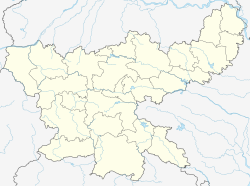McCluskieganj
McCluskieganj | |
|---|---|
Block | |
| Nickname: mini London | |
| Coordinates: 23°38′N 84°56′E / 23.64°N 84.94°ECoordinates: 23°38′N 84°56′E / 23.64°N 84.94°E | |
| Country | |
| State | Jharkhand |
| District | Ranchi |
| Block | Khalari |
| Languages | |
| • Official | Sadri, Hindi |
| Time zone | UTC+5:30 (IST) |
| PIN | 829208 |
| Vehicle registration | JH |
McCluskieganj is a small hilly town in Jharkhand State, India, about 40 miles (64 km) northwest of the capital, Ranchi. The town used to have a significant Anglo-Indian community at one time but this has declined considerably.
History[edit]
It was founded by the Colonisation Society of India in 1933 as a homeland or "Mooluk" for Anglo-Indians. Anglo-Indians could buy Shares in this co-operative[1] - The Colonisation Society of India - which in turn would allot them a plot of land. It became home to 400 Anglo-Indian families within ten years.[2] In 1932 Ernest Timothy McCluskie, a businessman from Calcutta, the founder of the town, sent circulars to nearly 200,000 Anglo-Indians in India inviting them to settle there.[3] Of the nearly 300 original settlers, only 20 families remain, as most of the Anglo-Indian community left after World War II.[3] The town has lush green surroundings, dirt tracks and fresh air to breathe.
Places[edit]
Today, most of the old mansions have been converted to guest houses for tourists. Duga dugi River and Jagriti Vihar are some of the places to visit. A unique cluster of a temple, a mosque and a gurudwara draws visitors from far off places. There is also a Don Bosco Academy in the town. A documentary was made about the town's community in 1993. McCluskie was a property dealer based in Calcutta. He used to visit some villages in the area for hunting, and even built a hutment at a place called Harhu. His friend PP Sahib worked as the manager of Ratu Shahansha's estate and it was he who convinced the Shahansha to lease out the land to McCluskie.
Subsequently, in 1933, the Colonisation Society of India Limited was formed and the Shahnsha signed an agreement with it. It was decided that the Anglo-Indians could build their settlement in nine villages on land not occupied by the original rahiyats (tenants) of those villages. It was also agreed that the settlers would not be allowed to acquire the rivers and the hills.
In popular culture[edit]
The town was the inspiration for the Hindi novel Maikluskiganj (मैकलुस्कीगंज) by journalist-writer Vikas Kumar Jha, which was translated into English by Mahasweta Ghosh in 2005.[4]
McCluskieganj is also the setting for the 2016 film A Death in the Gunj, which is Konkona Sen Sharma's directorial debut, and set in 1979.[5]
Aided by the stories of Buddhadeb Guha and Sunil Gangopadhyay, McCluskieganj has been a part of popular culture in Bengal. Guha's novel Ektu Ushnatar Jonno has played a major role in popularising this place as a tourist destination for Bengalis, especially during the fall and the winter seasons. [6]
Attractions[edit]
McCluskeiganj Gurudwara and Temple: lying in the same complex is a place of integrity and shows brotherhood of India.
McCluskeiganj Mosque: It is just besides the Gurudwara and Temple complex.
St. John's Church: A historical place built by Anglo-Indians during British rule.
References[edit]
- ↑ Kohli, Namita (25 December 2016). "A quiet Christmas at the Ganj - Hindustan Times". Retrieved 25 December 2016 – via pressreader.
- ↑ Memory, identity and productive nostalgia: Anglo-Indian home-making at McCluskieganj - Dr Alison Blunt Department of Geography Queen Mary College, University of London Mile End Road London E1 4NS
- ↑ 3.0 3.1 Deep Blue Ink -> Writing -> Features
- ↑ O'Yeah, Zac (3 October 2015). "Book Review – McCluskieganj: The Story of the Only Anglo-Indian Village in India". The Indian Express. Retrieved 24 June 2018.
- ↑ Vats, Rohit (21 July 2017). "A Death In The Gunj movie review: Konkona Sensharma makes a brilliant debut". Hindustan Times. Retrieved 24 June 2018.
- ↑ "Ektu_Ushnotar_Jonne".
External links[edit]
- Time Magazine story about McCluskieganj
- Mccluskieganj (MINI London) Facebook Account
- McCluskie's Ganj: The Lost Home of The Anglos (2014): short video documentary on McCluskieganj by Dhiraj Singh





